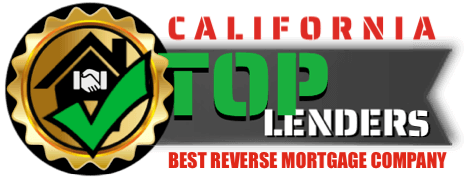BEST CALIFORNIA REVERSE MORTGAGE LENDERS
BEST CALIFORNIA REVERSE MORTGAGE COMPANIES

benefits of a reverse mortgagE
Reverse mortgage loans offer several potential benefits for senior homeowners, such as no monthly mortgage payments, tax advantages, cash disbursement options to receive loan proceeds as a lump sum, monthly payment or a line of credit.
WHAT IS A REVERSE MORTGAGE
A reverse mortgage is a financial product designed for homeowners who are aged 62 or older and allows them to convert a portion of their home equity into cash. Unlike a traditional mortgage where the borrower makes monthly payments to the lender, with a reverse mortgage, the lender makes payments to the borrower.
The main feature of a reverse mortgage is that it provides homeowners with a way to access the equity in their homes without having to sell the property or make monthly mortgage payments. Instead, the loan balance accumulates over time, typically with interest, and is repaid when the borrower sells the home, moves out, or passes away. At that point, the proceeds from the sale of the home are used to repay the loan, with any remaining equity going to the homeowner or their heirs.
There are several types of reverse mortgages, but the most common one is the Home Equity Conversion Mortgage (HECM), which is insured by the Federal Housing Administration (FHA) in the United States. HECM loans have certain requirements and limitations set by the FHA to protect both borrowers and lenders.
Reverse mortgages can provide financial flexibility for seniors who have a significant amount of equity tied up in their homes but need additional income for living expenses, healthcare, or other needs. However, it's important to carefully consider the implications and costs associated with a reverse mortgage, as it can impact the borrower's long-term financial situation and the inheritance they leave for their heirs. Consulting with a qualified financial advisor is recommended before pursuing a reverse mortgage.
BENEFITS OF A REVERSE MORTGAGE LOAN FOR SENIOR HOMEOWNERS
Reverse mortgage loans offer several potential benefits for senior homeowners. Here are some key advantages:
- Access to Home Equity: A reverse mortgage allows senior homeowners to tap into their home equity without selling the property. This can be particularly beneficial for those who have a significant portion of their net worth tied up in their homes but need additional funds for various purposes, such as covering living expenses, medical bills, or home renovations.
- No Monthly Mortgage Payments: Unlike a traditional mortgage, with a reverse mortgage, borrowers are not required to make monthly mortgage payments. The loan balance accumulates over time, typically with interest, and repayment is deferred until the borrower sells the home, moves out, or passes away. This can alleviate financial strain for seniors on fixed incomes, as they can receive loan proceeds without the burden of monthly payments.
- Retain Ownership and Residence: With a reverse mortgage, homeowners retain ownership of their homes and can continue living in the property as long as they meet the loan requirements, such as maintaining the property as their primary residence, paying property taxes, and keeping up with insurance and maintenance obligations.
- Flexible Disbursement Options: Reverse mortgages offer various disbursement options, allowing homeowners to choose how they receive the loan proceeds. Options include receiving a lump sum, monthly payments for a specified term or for as long as they live in the home, a line of credit that can be accessed when needed, or a combination of these. This flexibility enables homeowners to customize the loan to meet their specific financial needs.
- Potential Tax Advantages: In most cases, reverse mortgage loan proceeds are considered loan advances and are not subject to income tax. Consult with a tax advisor to understand the specific tax implications based on your individual circumstances.
- Non-Recourse Loan: Reverse mortgages, particularly those insured by the Federal Housing Administration (FHA), are typically structured as non-recourse loans. This means that the borrower (or their estate) will never owe more than the appraised value of the home when the loan becomes due, even if the loan balance exceeds the value of the property. This protects borrowers and their heirs from being personally liable for any shortfall.
RETIREMENT MONEY
ButtonWhat is the difference between a regular mortgage and a reverse mortgage?
Reverse mortgage loans offer several potential benefits for senior homeowners. Here are some key advantages:
- Access to Home Equity: A reverse mortgage allows senior homeowners to tap into their home equity without selling the property. This can be particularly beneficial for those who have a significant portion of their net worth tied up in their homes but need additional funds for various purposes, such as covering living expenses, medical bills, or home renovations.
- No Monthly Mortgage Payments: Unlike a traditional mortgage, with a reverse mortgage, borrowers are not required to make monthly mortgage payments. The loan balance accumulates over time, typically with interest, and repayment is deferred until the borrower sells the home, moves out, or passes away. This can alleviate financial strain for seniors on fixed incomes, as they can receive loan proceeds without the burden of monthly payments.
- Retain Ownership and Residence: With a reverse mortgage, homeowners retain ownership of their homes and can continue living in the property as long as they meet the loan requirements, such as maintaining the property as their primary residence, paying property taxes, and keeping up with insurance and maintenance obligations.
- Flexible Disbursement Options: Reverse mortgages offer various disbursement options, allowing homeowners to choose how they receive the loan proceeds. Options include receiving a lump sum, monthly payments for a specified term or for as long as they live in the home, a line of credit that can be accessed when needed, or a combination of these. This flexibility enables homeowners to customize the loan to meet their specific financial needs.
- Potential Tax Advantages: In most cases, reverse mortgage loan proceeds are considered loan advances and are not subject to income tax. Consult with a tax advisor to understand the specific tax implications based on your individual circumstances.
- Non-Recourse Loan: Reverse mortgages, particularly those insured by the Federal Housing Administration (FHA), are typically structured as non-recourse loans. This means that the borrower (or their estate) will never owe more than the appraised value of the home when the loan becomes due, even if the loan balance exceeds the value of the property. This protects borrowers and their heirs from being personally liable for any shortfall.






















